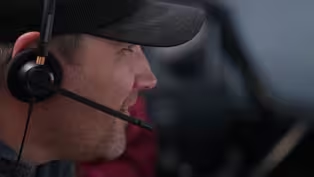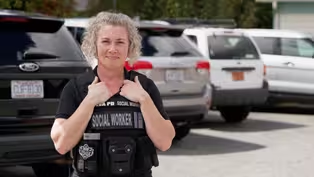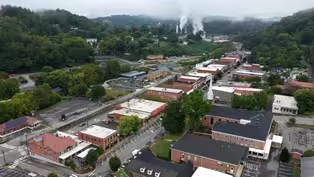
Rural Communities Are Rethinking Women's Incarceration
Clip: 2/21/2025 | 8m 25sVideo has Closed Captions
Rural communities are adapting as more women return home from prison.
Rural women are entering the criminal justice system at record rates, creating new challenges for communities with limited resources. This video examines how rural areas in North Carolina are responding to the growing need for reentry support. Note: Benevolence Farm, featured in this story, has built a prototype of its tiny home, and is fundraising to build seven more.
Problems playing video? | Closed Captioning Feedback
Problems playing video? | Closed Captioning Feedback
ncIMPACT is a local public television program presented by PBS NC

Rural Communities Are Rethinking Women's Incarceration
Clip: 2/21/2025 | 8m 25sVideo has Closed Captions
Rural women are entering the criminal justice system at record rates, creating new challenges for communities with limited resources. This video examines how rural areas in North Carolina are responding to the growing need for reentry support. Note: Benevolence Farm, featured in this story, has built a prototype of its tiny home, and is fundraising to build seven more.
Problems playing video? | Closed Captioning Feedback
How to Watch ncIMPACT
ncIMPACT is available to stream on pbs.org and the free PBS App, available on iPhone, Apple TV, Android TV, Android smartphones, Amazon Fire TV, Amazon Fire Tablet, Roku, Samsung Smart TV, and Vizio.
Providing Support for PBS.org
Learn Moreabout PBS online sponsorship- There are more women incarcerated in North Carolina than ever before in history, and they're not in urban centers like you would imagine.
Most are right here in rural communities.
And it used to not be this way.
In fact, for a long time, if you lived in a city, you were much more likely to end up in jail than if you called the countryside home.
But about 20 years ago, things started to flip.
Now rural people are more than twice as likely to land behind bars versus those in urban areas.
And once these women are released, they face a whole new set of hurdles: finding a job, finding a place to live, and even reuniting with their children and family.
So how did we get here, and who's stepping up to break this cycle?
I'm David Hurst.
This is "ncIMPACT."
[upbeat music] During her four and a half years in prison, Mona Evans was told life after release would be manageable.
If she followed the rules, opportunities would be there.
- That wasn't true.
So I was completely blindsided, honestly.
- [David] When women like Evans return to their rural or small town communities, they often face significant barriers with limited resources to overcome them.
And now that more women are cycling through the system from these areas, the need for support after release is growing.
In fact, nationally, women's incarceration has grown as twice the pace of men's in recent decades, and that's not happening in big cities but in small rural communities.
So how did we get here?
Well, it all began in the 1990s, which marked a turning point in women's incarceration rates.
The widespread adoption of broken windows policing led to increased arrest for minor offenses like petty theft, disorderly conduct, and loitering.
At the same time, the war on drugs escalated the criminalization and enforcement of drug offenses.
These changes cast a wider net in snaring more individuals in the criminal justice system.
Now, these policies affected both men and women, but they had a disproportionate impact on women.
They're just more likely to be involved in the minor offenses targeted by these new approaches.
At the same time, rural jail populations had been surging.
Rural areas of between 10,000 and 50,000 people now have the highest rates of pre-trial detention.
But why is that?
Well, researchers say that it stems from a complex web of issues, including limited alternatives to incarceration, rising pre-trial detention rates, and increasing financial incentives to contract out jail beds.
Fast-forward back to now and former incarcerated women are facing a dire housing crisis, 10 times more likely to experience homelessness than the general public.
They're also required to pay double the standard security deposit by property managers.
- Affordable housing is a big crisis right now, but for people who are coming out of prison who don't have savings or a job immediately, finding a safe and secure place to live is nearly impossible.
- [David] This is what inspired initiatives like Benevolence Farm.
It's a quiet 13-acre farm in rural southern Alamance County.
They provide transitional housing and part-time employment for women leaving incarceration.
But even they can't keep up with the demand.
Last year alone, they had to turn away 41 women due to lack of space.
So they rolled up their sleeves and built tiny homes on the farm property.
- Yeah, so this is an example of what we're trying to build.
We're currently fundraising to build about seven more of these.
Someone's gonna move in, and in the next few weeks or so, they'll have full access to a bathroom with their own shower, kitchen, little reading/relaxation/office area.
And then obviously, the bedroom is upstairs.
- So the goal is always short-term until they can find somewhere on their own, right?
- Yeah, the idea, ultimately, even for Benevolence Farm, we want to create systemic change, so we want to be able to have people live in their community and be accepted.
And so, ultimately too, we wanna be able to connect people to renter or apartment leasers and property managers so that they can live in community coming out of prison.
- [David] But even with the tiny homes, Benevolence Farm can only accommodate a handful of women at a time.
So they joined forces with organizations across the region to expand their reach, organizations like Jubilee Home, just down the interstate in Durham.
After decades of providing traditional housing for men, Jubilee Home is now expanding their mission.
They're opening their first home for women.
- This here was all open, kind of community space, with the kitchen seamless into dining and living, but then also separate from the living space upstairs where we have three bedrooms and two bathrooms.
So we'll be able to house probably four women.
It's a great layout for what we wanna do and we're really excited to be able to offer this.
- [David] But even after women leaving incarceration find a place to lay their head, their next big challenge is finding work.
Take Mona Evans.
Today, she works full-time at Benevolence Farm, but her job search after release revealed an unexpected reality.
- Prior to incarceration, certain jobs was jobs I wouldn't even apply at.
So it was kind of very discouraging that, you know, I was denied these opportunities after incarceration.
- Benevolence Farm is able to offer employment through their sustainable farming and body care product lines.
But it's limited, as it only offers part-time work for a handful of women.
And perhaps this is why North Carolina decided to take broader action.
Under Executive Order 303, the state has set an ambitious goal: increase the number of businesses hiring former inmates by 30% before 2030.
And with more than 100 million now directed toward reentry support, North Carolina is putting special emphasis on helping rural communities.
What does that mean to you that more resources, funding, are starting to funnel towards rural communities?
- Rural reentry is really important to us, obviously, being here in Alamance County, but I think it also shows the investment in the people who often feel forgotten in rural communities.
So to know that rural reentry investments are coming down the pike is a way to show that we care about the people who are returning home to rural and their families as well.
- But employment and housing are only part of the whole reentry story.
Think about it.
When someone is coming back, they're juggling a lot.
They not only need housing and a job but also healthcare and food.
Evans says depending on the woman's convictions, some residents do not receive food stamps.
North Carolina is one of 21 states that have some sort of permanent ban for individuals with serious drug felonies from receiving food assistance from the federal government.
Returning citizens are twice as likely to experience food insecurity compared to the general population.
And if you're a mother, that's a very scary statistic.
And how much of a challenge is that for people when they're not able to access SNAP benefits?
- For someone that was coming home from prison in this situation and was not at a reentry program, not only would they be looking at possibly being homeless but now trying to figure out where to get food also.
- [David] Data from state and federal agencies show that effective reentry programs can reduce the chances of people getting locked up again.
But the Department of Justice emphasizes an important caveat: programs that work in one community may not work in another.
In fact, they say ineffective programs are not only a poor allocation of time and resources, they may also contribute to recidivism.
That's why North Carolina, and their new $100 million investment I mentioned earlier, hopes their approach will be different.
Instead of a one-size-fits-all solution, the funding will establish 11 new local reentry councils.
This will bring services to 27 more counties, including Alamance.
These councils unite local organizations and resources, creating a one-stop shop where returning residents can access coordinated support based on their specific needs.
But while state funding and new programs promise change, some of the most meaningful support may come from those who have walked this path before.
- I know a lot of times, whether they're parents or if they're just being released from prison, they're trying to find their way, it is very cool for them to come into the house and see, you know, the work that I'm doing here and then also, like, see me on staff, and that gives them a sense of hope.
So, I take pride in it.
- [David] For Mona Evans, her experience is now helping other women write their own success stories at Benevolence Farm.
♪ Let's lose track of time ♪ ♪ Oh, darling, stay for a little longer ♪ ♪ While I hold you tight ♪ - [David] For "ncIMPACT," I'm David Hurst.
Fixing the Emergency Call Staffing Shortage
Video has Closed Captions
Clip: 2/21/2025 | 5m 54s | 911 centers face a critical dispatcher shortage as cities rush to staff emergency lines. (5m 54s)
How Alternative Policing in Rural America Could Work
Video has Closed Captions
Clip: 2/21/2025 | 8m 16s | Small towns reshape their crisis response. Are social workers the future of public safety? (8m 16s)
Video has Closed Captions
Preview: 2/21/2025 | 20s | As public safety needs evolve, communities pioneer creative solutions to protect their residents. (20s)
Providing Support for PBS.org
Learn Moreabout PBS online sponsorship
- News and Public Affairs

Top journalists deliver compelling original analysis of the hour's headlines.

- News and Public Affairs

FRONTLINE is investigative journalism that questions, explains and changes our world.












Support for PBS provided by:
ncIMPACT is a local public television program presented by PBS NC


